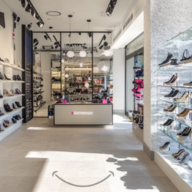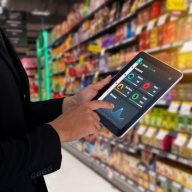Smart sustainability

Retail
186 week ago — 7 min read
The COVID-19 crisis has catalysed the urgent need to act on environmental sustainability. Retail has been one of the hardest hit industries. A lack of disposable income and changes in consumer behaviour brought on by the coronavirus pandemic and concerns about the advancing climate crisis have forced brands to consider the social and environmental impacts of their businesses.
Conscious consumers
Consumers have been urging brands to act responsibly. About 88% respondents of retail survey by McKinsey believe that more attention should be paid to reducing pollution. More than 60% respondents report going out of their way to recycle and purchase products in environmentally friendly packaging. About 57% respondents made significant changes to lifestyle to lessen environmental impact.
Balancing risks
In a climate of increasing uncertainty, changing attitudes, and inconsistent regulations, enterprises face a myriad of risks. They need to manage legal risks, operational risks, changing customer demands and expectations, and the resulting reputational risks. Due to their proximity to consumers, retail companies have to shoulder much of this weight. According to the World Economic Forum’s 2019 list of global risks, mounting investor interest in climate change is driving broader consideration of the financial consequences of systemic environmental, and social risks. The management of these risks is often referred to as ESG (Environment Social Governance).
An organisations’ ESG strategy could include initiatives to optimise energy usage, reduce water consumption, manage landfills better and be compliant with regulations. For the strategy to be successful, organisations need to prioritize their sustainability agenda and dedicate resources to the cause, though, for a majority of organizations, this is not an easy task.
Fortunately, we are living in the era of Industry 4.0, which is a collective term given to upcoming data technologies, sometimes referred to as smart technologies. These technologies can help retail organisations create their optimal sustainability model.
To formulate a good strategy, one must know one’s goals and contextualize them with one’s capabilities and regulatory requirements. This is a formidable task even for the best and brightest strategy consultants.
Technology to the rescue
The future is not all bleak. Fortunately, we are living in the era of Industry 4.0, which is a collective term given to upcoming data technologies, sometimes referred to as smart technologies. This includes Big Data analysis, Internet of Things (IoT), Machine Learning (ML), Artificial Intelligence (AI), Virtual reality (VR), and blockchain. These technologies can help retail organisations create their optimal sustainability model.
Industry success depends on achieving a balance between supply generation, efficiency, and sustainability of energy. Through processes like Deep Learning, AI can recreate human learning to develop a comprehensive understanding of climate data and have the ability to model and predict energy needs and shortages. Such smart technologies can generate hundreds of sustainability modelling frameworks and run simulations through digital twinning to enable a desirable, feasible, and viable sustainability program for organisations. This is particularly helpful for an industry like retail that works on thin margins.
The power of emerging interconnected technologies can be harnessed through cloud-based, data-led, and design-led platforms that will prioritise the efforts based on operations and systems data combined with certain pre-configured algorithms. An ideal strategy platform helps foster an ecosystem of connected products, operations, data, and an experience focused on artificial intelligence, enabling a cognitive value chain. A connected cognitive value chain can allow retail companies to provide an omnichannel experience. An omnichannel experience is when a customer’s experience is consistent through all retail channels e.g. website, app, sales outlet, and online order + in-store pick up. This allows retail businesses to maintain healthy sales volumes even in events like the COVID-19 crisis that prevents customers from buying in-store and on-location.
Green and affordable
Going green doesn’t always need to break the bank. Industry 4.0 technologies allow businesses to self-direct their strategy in a quantifiable manner, improve interconnectivity, achieve greater information transparency, re-imagine their value chain, refine their customer/supplier relationships and recharge the company culture. Developing Industry 4.0 efficiencies will allow organisations to find new sources of revenue by creating new business models, monetising data, and shifting cost centres to profit centres, thereby, reducing the cost of going green. An example of this can be the creation of a circular economy of materials.
Going green doesn’t always need to break the bank. Industry 4.0 technologies allow businesses to self-direct their strategy in a quantifiable manner, achieve greater information transparency, re-imagine their value chain, refine their customer/supplier relationships & recharge the company culture.
Mandates like the Paris Agreement have already begun to necessitate corporate sustainability and this trend is likely to continue with local and international regulations. Sustainability will soon change from a value-addition to a necessity. Organisations that take control of their ESG strategy today will emerge as market leaders and thought pioneers of tomorrow. We must collectively take a leap toward sustainable business practices and greener value chains to ensure a brighter future.
Investing in emerging interconnected technologies like IoT for retailer-consumer connection, AI for improving shopping experience and Data Analytics for improving inventory management will shine the way forward.
Also read: Lasting wisdom: Lessons from the pandemic for retail businesses
Image source: shutterstock.com
Article published in STOrai Magazine and authored by Sudhir Soundalgekar. Sudhir is an architect passionately executing practices in Innovation, Sustainability, Education, Project Management and Artificial Intelligence. He has spent over 3 decades as an enterprising leader and a successful project professional across Retail, Commercial, Industrial, Warehouse and Residential industries in organizations like Raymond, Shoppers Stop, Tata AIA, and Bovis Lend Lease
Disclaimer: The views and opinions expressed in this article are those of the author and do not necessarily reflect the views, official policy or position of GlobalLinker.
View STOrai 's profile
Other articles written by STOrai Magazine
The Art & Science of People Pleasing in Retail
11 week ago
Most read this week
Trending













Comments
Share this content
Please login or Register to join the discussion